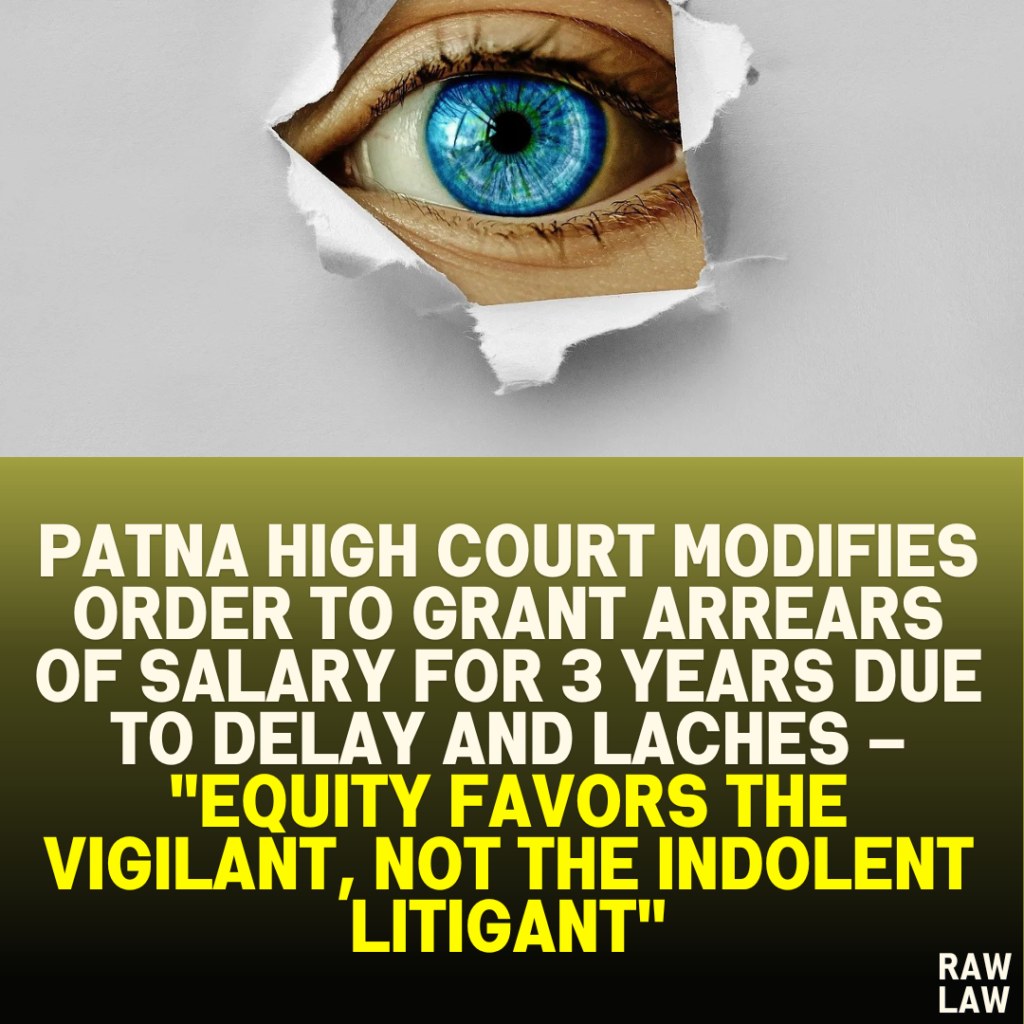Court’s Decision:
The Patna High Court modified the order of the learned Single Judge, granting the appellant arrears of salary from March 19, 2018, to March 19, 2021, instead of the original period claimed from April 2006. The court emphasized that equity favors the vigilant and stated that due to the long delay, the appellant cannot claim full arrears from 2006.
Facts:
The appellant, a Junior Engineer in the Rural Works Department, was appointed on January 11, 1988, and was discharging his duties until April 2006, when his salary payments were discontinued. Despite multiple representations and a letter dated June 18, 2012, from the Executive Engineer to provide his Last Pay Certificate, no steps were taken to resolve the issue. Consequently, the appellant filed a writ petition (CWJC No. 8020 of 2021) seeking directions to the department to release his unpaid salary from April 2006 onwards.
Issues:
The key issue before the court was whether the appellant was entitled to arrears of salary for the period of April 2006 to 2019, given that the claim was brought in 2021, and whether the doctrine of laches and delay should apply.
Petitioner’s Arguments:
The petitioner contended that the Single Judge erred in denying him arrears for the period of 2006 to 2019. He argued that non-payment of salary is a recurring cause of action, and hence, he should be entitled to arrears for the entire period. He relied on the judgment in Umar Shankar Prasad vs. State of Bihar [2009 (4) PLJR 632] to support his claim.
Respondent’s Arguments:
The respondents argued that the appellant’s writ petition, filed in 2021, suffered from inordinate delay and laches. They emphasized that the delay in filing the claim rendered it untenable and that the learned Single Judge correctly restricted his entitlement to arrears from 2019.
Analysis of the Law:
The court analyzed the principles of delay and laches as discussed in the Supreme Court’s judgment in Union of India and Ors. vs. Tarsem Singh [(2005) 8 SCC 648], where the Court held that service-related claims should normally be rejected on the grounds of delay and laches, except in cases of continuing wrongs. Even in such cases, arrears of salary should only be granted for a period of three years prior to the filing of the petition.
Precedent Analysis:
The court distinguished the case of Umar Shankar Prasad vs. State of Bihar, cited by the petitioner, by highlighting that the facts in that case involved prompt action following medical treatment, while in the present case, there was no plausible explanation for the appellant’s delay in approaching the court. Further, reliance was placed on Surjeet Singh Sahni vs. State of Uttar Pradesh [(2022) 15 SCC 536], where it was reiterated that representations cannot extend the period of limitation.
Court’s Reasoning:
The court found that the appellant had no valid reason for the long delay in filing his claim for arrears of salary. The representation dated December 13, 2019, did not contain any acknowledgment of receipt and appeared to be prepared only for the purpose of the writ petition. Applying the principles from the Tarsem Singh judgment, the court held that the appellant would only be entitled to arrears for the three years prior to the filing of the writ petition in March 2021.
Conclusion:
The appeal was allowed in part, modifying the Single Judge’s order to direct the respondents to consider the appellant’s representation and, if found entitled, pay his arrears of salary from March 19, 2018, along with his current salary.
Implications:
The ruling reinforces the principle that equity favors those who are vigilant in pursuing their claims. The judgment serves as a reminder that delayed claims without sufficient cause will only receive limited relief, as courts are reluctant to entertain stale claims, even if they involve recurring causes of action.



